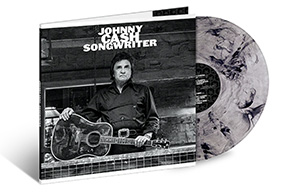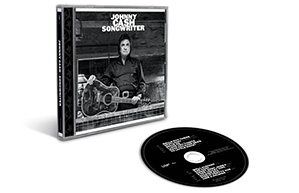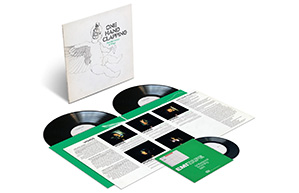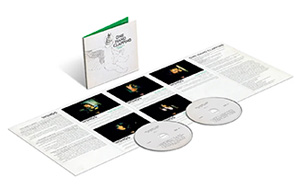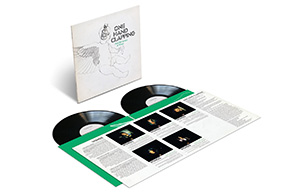Finding Closure Among The Comets: In Conversation With Bill Haley Jr
‘It is quite amazing that this music was so long ago but it just continues to have legs,’ says the son of the rock’n’roll frontiersman.
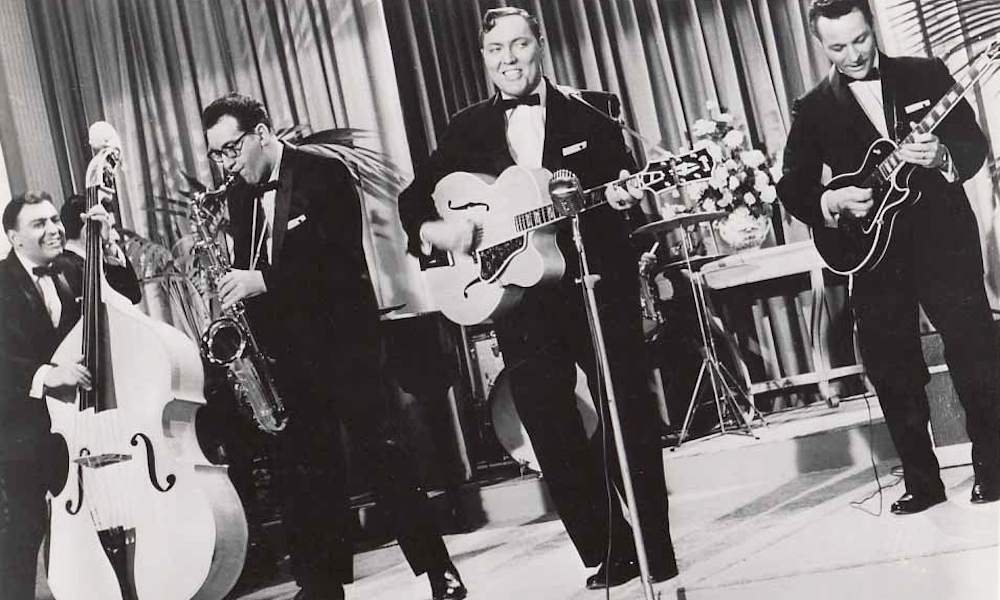
They were an unlikely phenomenon in the delivery room of rock’n’roll, led by an itinerant musician and former disc jockey who was blind in one eye and already 30 when he became a worldwide star. But, in terms of the mark they left on popular culture and the fondness with which they are remembered, Bill Haley and his group are the Comets that keep on coming.
The latest proof comes in the presence of their immortal “(We’re Gonna) Rock Around The Clock,” the song that indisputably lit the fuse of the rock’n’roll phenomenon, on What A Wonderful World, the latest in the popular and durable UK compilation series Dreamboats & Petticoats. The four-disc, 100-track festival of nostalgia is a wide-ranging pop celebration that travels everywhere from the Everlys to Engelbert and from Lonnie Donegan to Lesley Gore. But it also coincides with the 70th anniversary of the group that, in many ways, started it all.
Bill Haley and his Comets had existed in an earlier, more country-flavored form as the Saddlemen by the time they were renamed in 1952. Their frontman was already a veteran of many years of showbiz striving, paying the bills any and every way, including as a noted yodeller and western swing showman and managing a radio station in Pennsylvania.
The newly-coined group may not have invented rock’n’roll, but they became its first stars, enjoying some heady years before their momentum inevitably faltered. Haley fell into a long and largely self-inflicted decline that inflicted lasting pain on his abandoned families. That full story was told in frank detail in the 2019 book Crazy Man, Crazy: The Bill Haley Story, by his son Bill Haley Jr. with Peter Benjaminson, published in the US by Backbeat and the UK by Omnibus.
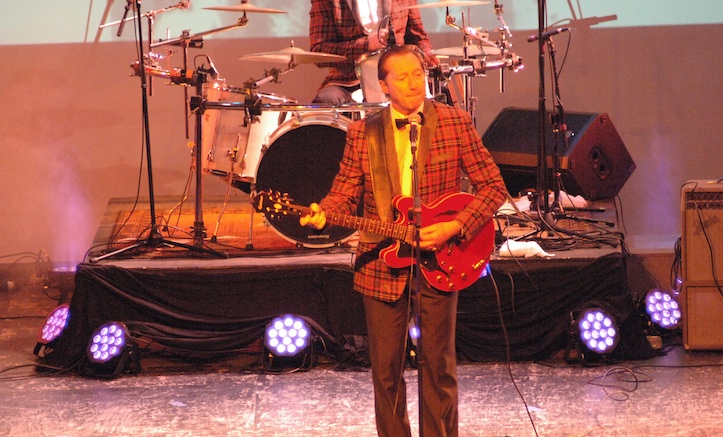
Bill Haley Jr on stage. Photo: Bill Haley Jr Archive
It’s a volume that offers an illuminating and alarming depiction of one man’s demons and how his professional rise and fall led to alcoholism and a completely disfunctional personal life, amid occasional glimpses of renewed popularity. But, as described by his second son, it’s also a tale of how Bill Haley Jr. came to terms with his father’s failings and made peace with them, so much so that he now leads his own band playing the Comets’ greatest hits.
“It is quite amazing that this music was so long ago but it just continues to have legs, so to speak,” says Haley Jr., speaking to mark the original group’s 70th anniversary and the latest “encore” for “Rock Around The Clock.” “I guess part of it is that it was such a fun time, it’s fun music and it brings joy and happiness. It’s simple, and as the world gets more complex and stressful, there’s a certain appeal to reminiscing about simpler times.”
Also the publisher of a business magazine in Pennsylvania, where he is based, Haley and his own group have recently returned from a six-day cruise when we speak. “I do these shows and meet all kinds of people,” he says, “but mainly the audiences are people that were teenagers, or pre-teens, when this music was new. It’s just amazing the impact that it had on them, even remembering minute details about where they were when they heard the record. It’s like time stops or something.”
Haley Jr. conducted endless research and interviews to help create a rounded picture of the complex father whose presence at home was so often denied him. “My primary motivation was trying to come to terms with my very disfunctional relationship with my father,” he confides. “He was really absent most of my life, then when we did connect, his alcoholism really prevented building that relationship that I so wanted.
“So this whole process of learning as much as I could about his career was absolutely cathartic. Then of course I also became intellectually interested, not only in my father’s career but that whole period of music, from the mid-40s to the early 60s. I became fascinated with the whole phenomenon of American music and what happened in those years.
Empathy overcomes resentment
“Researching and writing the book helped me work through that,” he goes on, “and really gain some empathy for my father, rather than resentment, but also fully understanding what it must have been like to be travelling away from his family, to be pulled in many directions, and understanding the joy he brought to other people’s lives. That’s very healing. And of course performing my father’s music, I’ve experienced this more directly.”
When his father found fame and fortune after years of struggle, it was the archetypal double-edged sword. “He had issues that probably would have affected him even if he wasn’t famous, in terms of his introverted personality,” says his son. “He was blind in one eye, which I’m sure did not help his confidence.
“Fame did take him away from his basic humanness. My father would always have one or two people around him constantly who were a shield, or a safe place for him. But he was his own worst enemy, in many ways. On the way up, he was very reluctant to go and meet the audience, do interviews, all the things you need to do.”
The boundless success of “Rock Around The Clock” itself was, as Haley Jr. points out, against considerable odds. “It wasn’t even written to be a rock’n’roll song,” he says. “It was kind of an offshoot of a Tin Pan Alley sound. It was originally written [by Max C. Freedman] in the key of F, the pace was much slower and it really wasn’t going anywhere.
“James Myers purchased it from Freedman and put a writing credit on it for himself [as Jimmy DeKnight]. He was really just trying to get it recorded somewhere, and when my father got a hold of it, he changed the key to A, sped it up and – consciously or unconsciously – he even changed the melody line to something very similar to a Hank Williams song, ‘Move It On Over.’” Haley Jr. was born in July 1955, the very month that “Rock Around The Clock” started an eight-week run at No.1 in the US.
“Rock Around The Clock” has ticked perennially ever since, repeatedly revitalized in such settings as the rock’n’roll revival of the late 1960s, the ’50s nostalgia of such 1970s vehicles as Happy Days and American Graffiti. In the UK, where it topped the charts for an aggregate five weeks in late 1955 and early 1956, it returned to the Top 20 in both 1968 and 1974. Hundreds of covers, many of them by artists whose very musical education it began, included a 2021 version by Ringo Starr.
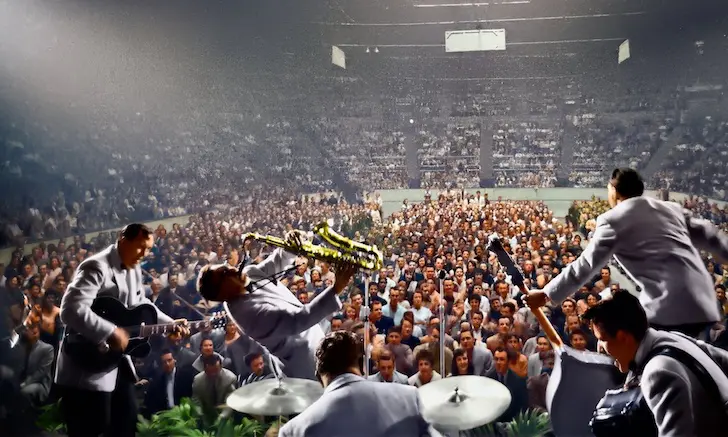
Bill Haley and his Comets in 1956. Photo: Bill Haley Jr on stage. Photo: Bill Haley Jr Archive
“From 1954 to about mid-1956, the Comets could do no wrong,” says the younger Haley. “But then Elvis dominated the charts and there was a whole slew of other young rock’n’roll artists having hits. So they took the show on the road, and did a momentous tour of Australia and that historic tour of the UK in February/March 1957. I think they were still thinking this would last forever, but upon returning from that tour, the writing was on the wall that it was basically over for them as a band.
“It wasn’t immediate. They really hung on as long as they could. By 1959, they lost the Decca contract; in 1960 they tried again with Warner Brothers, but those record didn’t sell, and by 1962 everything had just fallen apart. All their business endeavours had failed and they had tax issues because of poor management and poor accounting. Then I went into detail in the book about my father’s drinking, which really started after that UK tour. By 1962, he just fled the country and tried to run away from all his troubles, and also his first two families.”
There was another unlikely coda to the heyday, and it came south of the border. “Then,” says Haley Jr., “he experienced some level of success in Mexico, much to his surprise. He became known as the King of the Twist, and that in some ways emotionally filled that void, and gave him a taste of what he had before. Throughout the 1960s he kind of existed on his fame, playing a lot of small clubs and American armed forces bases in Europe.
“Then the rock’n’roll revival period from the late ’60s to the early ’70s gave him some new life. But it was probably hard for him to deal with, being on top of the world and then losing it all within a period of six or seven years, then just having little tastes of it.”
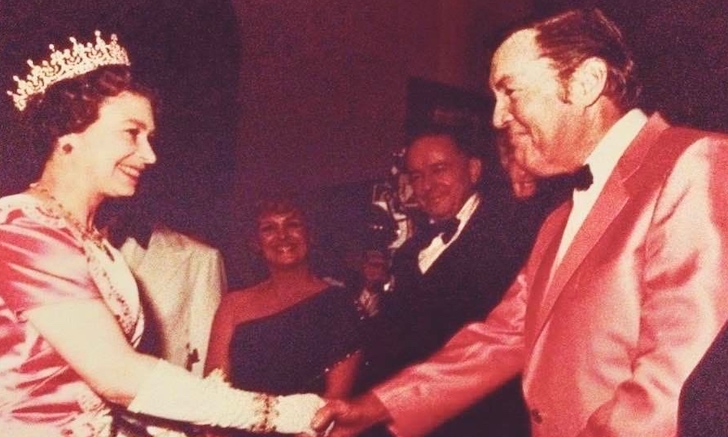
Bill Haley meets Queen Elizabeth II in 1979. Photo: Bill Haley and his Comets in 1956. Photo: Bill Haley Jr on stage. Photo: Bill Haley Jr Archive
Such a decline may seem to make for a dispiriting narrative, but in the book and his own life, Bill Haley’s son found unlikely closure. “To express my resolution of my feelings was very important to the story but also, that’s been my challenge in this lifetime. I didn’t ask to be born the son of a famous man and to have his name, and then to have him abandon our family and abandon me, and to put me in a position where I had to spend my life making sense of it personally.
“I had to endure that and try to create my own identity. All offspring of famous people have this blessing and curse, when they’re seen as an extension of someone more famous. To share that was hopefully a good thing for myself and for those who are interested in the story.
“Having avoided it my whole life, I finally came to terms with it,” declares Haley Jr., “and took advantage of the opportunities to go out and do this. I’m aware that many people will see this as me exploiting my father, but I really don’t see it that way. If I was going to exploit him, I would have done it at a much younger age.
“The unexpected benefit was not only getting to travel a little bit, but how therapeutic and healing it is for me to hear from other people how this music has impacted them. To hear someone thank me for what my father did,” he concludes, “it’s really quite incredible how it all turned around for me.”
Buy “(We’re Gonna) Rock Around The Clock” on Dreamboats & Petticoats: What A Wonderful World.


